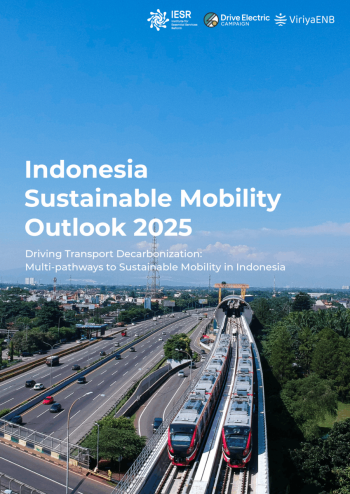Motion for the Future: Indonesia Sustainable Mobility Blueprint
Indonesia is at a crucial juncture in building a sustainable future. The transportation sector, which contributed approximately 24.63% of total national greenhouse gas emissions in 2024 and 28% of national carbon emissions from land transportation, presents both the greatest challenge and the best opportunity to achieve net-zero emissions by 2050. Increasing mobility and vehicle ownership continue to drive the upward trend in emissions, making transformative action imperative.
The Indonesia Sustainable Mobility Outlook (ISMO) 2025 responds to this urgent need for action. This report underscores that the rapid growth of the transportation sector alongside economic development has brought improved connectivity and mobility to millions of Indonesians, but also comes with significant environmental and economic costs.
The shift towards sustainable mobility requires fundamental changes that cannot be achieved through market forces alone. The report emphasizes the importance of coordinated policy measures, effective regulations, and strategic government investment. This includes implementing stricter emission standards, promoting the use of cleaner fuels, creating incentives for sustainable transportation choices, and increasing demand for electric mobility.
ISMO 2025 highlights several key pillars of Indonesia’s sustainable mobility strategy:
- Public transportation improvement: Investing in efficient, accessible, and clean public transportation systems to reduce the number of private vehicles and improve citizen mobility.
- Electric vehicle (EV) acceleration: Developing a robust local EV manufacturing system through incentives for battery, component, and assembly production, making Indonesia a regional hub for sustainable mobility manufacturing.
- Infrastructure development: Building charging networks, increasing electricity grid capacity, and providing the necessary infrastructure for sustainable mobility across urban and rural areas.
This report, based on evidence, best practices, and the specific national context of Indonesia, presents a comprehensive analysis and action agenda for all stakeholders. Together, we can build sustainable mobility that benefits society while protecting our planet for future generations.
Sustainable Mobility, Sustainable Transportation, Greenhouse Gas Emissions, Indonesian Electric Vehicles, Transportation Decarbonization, ISMO 2025, Net-Zero Emissions, Transportation Policy, EV Infrastructure, Indonesian Public Transportation

